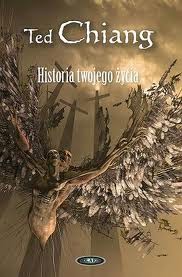

Despite the towering complexity of the setting, I found myself unable to relate to the characters, and the human element of this story is not present as it is so fundamentally in the others, so that the end result after reading was a simple shrug from me, and a continuation on to see what the next story had to offer.īut where Chiang succeeds beyond what I’ve previously mentioned is the total spectrum of his tales.

Where the majority of Chiang’s stories are an equal blend of plot, humanity, complex concept exploration, and world, “Seventy-Two Letters” leans far too heavily on the world, so that the other elements suffer. “Seventy-Two Letters” stands out to me as one of the lowest quality ones included. The human element is so real, so very breathtaking, that it makes the science fiction elements-the alien invasion, seeing the future-not only utterly realistic, but utterly accepted as truth, and the reveal at the end is much like discovering the secret to the universe surprising, yet inevitable, as if you had known it all your life, but just needed someone to flick on the light so you could finally see.īut when “Story of Your Life” reaches such a tier of acclaim, it’s hard to reach that tier again: some stories in this collection are markedly worse than others. The titular story, “Story of Your Life,” resonated with me in a way the majority of stories don’t. In “Understand” one of Chiang’s most ambitious stories, and perhaps the perfect embodiment of the review on the back cover: “Chiang pulls from science fiction the wealth of possibility it has always seemed to be,” he tackles what advanced intelligence could look like, what the collision of personalities could be when they have ascended beyond what any human has ever achieved, and unpeels the question of whether or not they are humans any longer because of it. In “Division by Zero,” the protagonist, a genius mathematician, discovers the meaninglessness of life after proving the entirety of mathematics, the entirety of her purpose, as fundamentally flawed when one equals zero, she unravels, much like the tower of mathematics itself when plucking one of its foundational bricks from the bottom, sending it crashing down. In this case, the concepts he tackles is the train: every single one is a big idea, grounded in math, science, or philosophy, and yet, Chiang manages to take those big ideas and construct a comfortable vessel of travel for you, embodied through his characters and their journeys. Every word, every sentence, is a steel bar, a cog, a nail-simple on their own, but sturdy and precisely crafted, as they must be, because when creating a railroad, precision is critical, otherwise, the train derails, crashes, and we, as readers, burn. His style is subdued, sparse yet finely tuned, like a railroad carrying you across the original landscape of his ideas. Perhaps that’s an over exaggeration, much in the way that Chiang’s prose isn’t. It was as if, when I closed the book, the clouds had parted in “Hell is the Absence of God” and I glimpsed the glory of Heaven’s light for the first time, knowing assuredly that eternal love exists. To be honest, he just never quite seemed worth the commitment, as many new authors don’t seem to be-it is much harder to get up off the comfortable chair than remain sunken within it.Īnd yet, when I finally did commit, I found myself transformed, and his stories imprinted on me forever. And yet, I always seemed to find an excuse not to go see it, whether it was the distance, or the price, or my lack of reading time, or maybe just my inherent laziness. I’d heard of Ted Chiang in the city of science fiction, he is the architect always erecting the newest marvel in the art center every year.


 0 kommentar(er)
0 kommentar(er)
